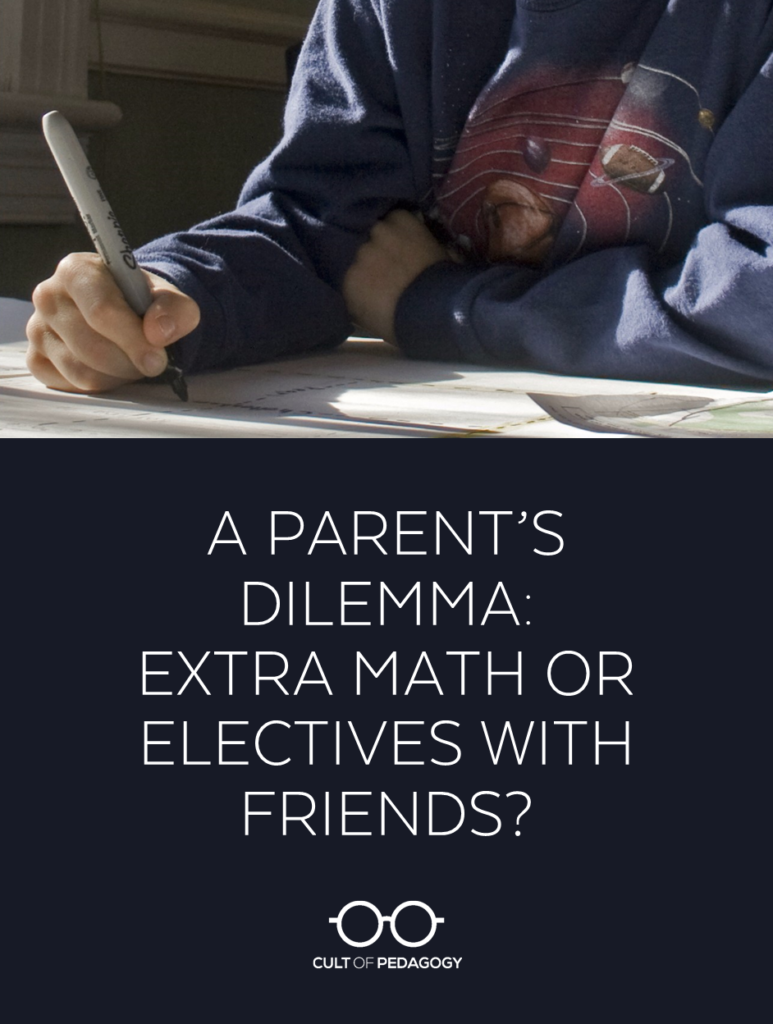
“boy, with homework” by woodleywonderworks is licensed under CC BY 2.0
Hi Jennifer,
I am the parent of a 6th grader. My son is a great boy and student. I like to say with every child there are strengths and support needs. My son’s support needs are in the area of math. I need your opinion on two issues: My son has been assigned to a math reinforcement class, instead of a third elective. He is devastated because he is worried about what his friends will say (typical middle schooler). I explained that it’s up to him how long he will stay in this class but he feels like it’s the end of his middle school world already. I was told that I could opt him out, but I really want him to get support.
My other dilemma is whether I should send his teachers an email and give them some idea about how he’s feeling. I’m trying not to be a “helicopter” mom but I don’t want him to come off as being a uncooperative kid. As a middle school teacher would you feel like I was a meddlesome mother? Please advise.
Sincerely,
A Concerned Parent
Hey there,
I’m going to tackle your questions one at a time, starting with the second one: You should definitely let your son’s teachers know how he is feeling. I think the term “helicopter parent” has made far too many parents pull way back on the parenting, for fear of being labeled as over-involved. I would love to delve more into this topic in a later post, but for now, I will just say that a good teacher will appreciate knowing how their students feel about school. Giving his teachers the heads-up on his concerns will help them understand his behavior better and will ideally make them less likely to shine a spotlight on his need for additional math help.
As for the question about whether your son should stick with the extra math help or opt out in favor of a third elective, I would like to ask my readers to offer their expertise. My background is in English language arts and I don’t feel qualified to help you make the call. So what do you say, math teachers? Obviously, we don’t have all the details on this situation, but what information would help you decide? What conditions would make choosing the elective a better option? If he were to opt out of the math reinforcement, are there other ways he could get the support he needs? Please offer your guidance in the comments below, including links to further resources, if you have them. ♦
Do you need advice on a teaching-related issue? Contact me and I may feature your question in a future blog post.
I would love to have you come back for more. Join my mailing list and get weekly tips, tools, and inspiration—in quick, bite-sized packages—all geared toward making your teaching more effective and joyful. To thank you, you’ll get a free copy of my new e-booklet, 20 Ways to Cut Your Grading Time in Half. I look forward to getting to know you better!





First, how great that the parent is considering their child’s feeling in the decision. Many times I see adults making decisions for kids and ignoring their feelings in that process.
As for the math “reinforcement class,” I’m guessing it is an intervention class. I think these can be done well, but if not it’s because of one or more of these reasons:
-no best practice in math education is being used, instead it is more procedure/drill & kill
-kids are just put on a computer to “practice,” on a program such as IXL Math (boring!)
-the teacher is not trained as a math teacher (that teacher might not even LIKE math or want to be teaching the class)
-there is no defined standard for being in the class besides a “bad grade in math,” which mean there could be students in the class with poor behavior or homework completion, but no real need for a math intervention (not the student in your question, but would other students in the class be a behavior problem taking time away from this student getting help?)
-there is no defined criteria for a student to exit the intervention (are they stuck in the class for the rest of the year?)
If I were talking with this parent, I would encourage them to find out how students are selected, what the program is that they will be using, and how students exit the intervention. Finding out the answers to these questions and determining if it seems like a high quality, well managed intervention will help make an informed decision. However, if one of the problems I listed above seem to be the case in this class, I would opt out.
I agree with Annie above. Find out what the criteria for being placed into this class is. Many times it’s a grade or a test score. If they are just going to be sitting on a math website doing practice, volunteer to have the student do that at home for 20 minutes a day. I believe websites are great practice, but during the school day to be another class is not the best use of them.
As a parent, you can sign up for IXL.com, StudyIsland.com or ProdigyGame.com and allow the practice at home. The cost is not that bad. If the school already uses one of the mentioned sites, ask if they can still assign the student a username, but do the activity at home so that the student can be in another elective.
I know that doing things online at home seems like a good option, but how do you suggest it gets done in homes that do not have access to the internet?
Hi Anthony,
You might want to take a look at some of the ideas in When Your School is Short on Tech, particular the section about blended learning and off-campus work-arounds. I’m thinking some of these solutions could work be adjusted for students who don’t have internet at home.
It’s great that she is an involved parent, but she needs more information about the reinforcement class. If the class simply re-teaches his grade level curriculum in a louder and/or slower voice, everyone’s time is wasted. Take the elective. How frustrating to hear over and over something you simply don’t understand.
If, however, he will be taught at his true instructional level, gains can be made. If the reinforcement teacher can find the gaps in his math progression, they can be addressed and over time he will catch up to his grade level. How much time depends upon the number and depth of those gaps. This way he can see and end to this class and not an end to his middle school world.
Hey, math teacher here! I agree with Ed (who commented on Facebook) How about allowing the elective with the caveat that our 6th grader do at least x minutes of Khan Academy math work each day? Khan is a wonderful tool and my students really like using it.
I agree that the student and parent need to be clear on the requirements to be placed into such a class. I also agree that time is wasted if the material is just a parroted version of the class the student was in.
Where I start to diverge from the other comments is that remedial math is always a good thing, even for those well practiced folks. I teach mathematics at a college and I practice my addition, subtraction, multiplication and division daily with an iPhone app because I require my students to do math in their head; this is a pretty standard requirement for collegiate mathematics, and certainly can’t hurt your student in middle or high school.
In addition, I tend to agree with NCTM and MAA when it comes to best practices and developmentally appropriate mathematics. Both organizations wrote a joint statement recently that essentially said the proper foundation for life long mathematics lies in basic algebra, geometry, and (if time permits) advanced algebra. It just so happens that under the Common Core (which your student is now part of) essentially front loaded all the necessary material for these classes so they could be completed by the end of ninth grade. Backing up the timeline, this means your student is going through the necessary prerequisites in 6th and 7th grade. If the student is not prepared to go into this material, I would tend to side with the teachers who evaluate the student every day and trust them to treat the student with the respect, sensitivity, and developmentally appropriate material they need.
Joshua, thank you for your detailed response. Looking down the road to high school math is so important, so having you trace those steps backward for us really helps. It sounds like the key here is for the parent to learn more about what approach will be used in the reinforcement class, determine if the instruction will be worthwhile, then decide if the class or outside tutoring would be a better option. It might help to ask the teachers about the success rate of this class.
I think I might be on the other side of this argument. He was probably placed in this class for a reason, not for a random purpose.
Getting extra math practice is needed in middle school to supplement the class that he is obviously missing or wouldn’t be in the class.
In my personal opinion I would not take my son or daughter out just to be with their friends. I would like to know how he could get out.
Trever, if I’m understanding you correctly, in that last sentence you’re suggesting the parent should find out what goals the student needs to reach in order to no longer need the extra help, yes? If that’s the case, I think it’s a great suggestion, for the parent, student and teacher to all be clear on the milestones that need to be reached to exit the class, rather than just opting out.
If this is a class that is temporary, I would stress that. I teach a class at the high school level that parents have issues with. I wish it didn’t exist. It is for the kids who do not test into algebra. I’ve teach based off my pretest scores. One year I started at 1+1. If he can get it now add if he shows improvement to be taken out, I say get it now.
Better now than in high school where it doesn’t count for a math credit towards graduation.
Just so you know, I teach that class with the same passion as my other classes. And have a 85% success rate with those kids passing algebra 1. I just wish it was 100%.
Kimberley, thanks for this important contribution. As the student in question is a 6th grader, not getting enough help now could result in years of academic struggle later.
All kids need math support. Even the kids in so-called “accelerated” classes because they have skipped over the fundamentals without really understanding the relationships involved in mathematics. So: a) I’ve taught Sixth Graders for several years and this is often a developmental issue–he’ll grow out of it; b) this student will have plenty of opportunity for more mathematics in 7th and 8th grade where a strong Math teacher can build those fundamentals of number sense, expressions, and proportional reasoning; c) the cost of making the student endure what will most likely be an after-school drill-and-kill, worksheet nightmare is not worth the negligible benefit. Let him take the elective. Find out what the real issues are. Find out how the school would address those issues and what their success rate is. There’s a big difference between being able to do a times table in five minutes and being able to explain how mixed number multiplication demonstrates the Distributive Property and why that’s valuable. Finally, I agree with Jennifer: give his teachers a heads up on how he feels.
Thanks for all of your helpful and wonderful comments. You guys have given me some great questions to asks his teachers and the administration at his school. My son said to me yesterday that the kids in his reinforcement class exhibit kindergarten behavior (his exact words). He said mom I’m so frustrated, I really hate that class. He said we cut out dinosaurs today. I took a deep breath and said were you sorting?
Let me tell you really quickly what I believe are my son’s true problems with math. He has poor Self-Efficacy when it comes to math. You know the old adage, nothing breeds success like success. He doesn’t like it because it doesn’t come easily to him and he hasn’t been really successful at it. He has a diagnosis of ADHD (inattentive type), and paying attention to signs and seeing the problem through is his biggest challenge. He has never gotten lower than a grade of “C” in math. Actually last year was the first time he received a “C” as a final in math. My son attends school that has selective admissions. In other words, all high achievers. When compared to above average students in math, he doesn’t look so good.
I can’t say I agree with just one person’s comment, because that would not be true. I think everyone has a valid point and I appreciate and value everyones opinion.
After I post this, my next step is to make an appointment with his teachers. You guys are fabulous. Jennifer thanks for posting my question, you have empowered me.
Terese, I’m so happy to have you comment here, and to know that this discussion has been helpful. I’m sure others with the same dilemma will find this post later on, so feel free to come back and tell us what you decided to do and how your son has progressed. And thank you for sharing your question with me!
Can you enter the second math class during the year?
It’s great that a student is motivated/excited to take a class!
My first reaction is to ask the parent to sit down and have an adult conversation with him. Even though it’s come up, set aside a time to talk about it. Then both can express concerns – the parents want him to make sure he has strong math skills, he wants to enjoy school (and I’m sure that’s on the parents’ list too, only academics tend to come first).
Maybe they could set a probationary period – the first term – and it’s up to him to make sure (1) he is keeping up his math grades and (2) the elective grade is good too.
Then, everybody could come out ahead. As long as there’s communication and discussion, I think it will end positively.
Did she say 3rd enrichment?
Yes, she needs to meet with the teacher but I also want to stress the importance of academics over enrichments if the latter is not aligned to math academics. What is defined as an enrichment? What are his math skill gaps? Can they be addressed in another way? Are three enrichments advisable in terms of aligning with core subjects needed to graduate? As adults sometimes we have to make decisions that our children do not like. Get the facts and be prepared to do what is best for the child in school not what will make him more pleasant to be around. Been there, done that. My sons are now grown and functioning well in society. They got over being mad and are great in math.
Good luck.
I had a similar, yet different, experience with my son this year. He is also in middle school but he does well in math. The school, without my input or permission, placed him in a super accelerated math class last year. He was ecstatic, I was not. He did very well in the course and enjoyed being with his friends.
However, I discovered that students in this particular acceleration do not do well in high school math. They complete both Algebra I and Geometry during middle school, but they have rushed through the basics so fast they fall behind in the higher level maths. As a parent and a high school math teacher this made me very frustrated. He wants to be an engineer and will need very strong math skills.
So, I talked to everyone. I talked to Guidance counselors, math teachers at the high school, math teachers at the college, parents of students who had gone through this program prior, etc. Then I sat down with my son and we discussed the options, with many tears and my son feeling very discouraged. He really wanted to stay with his friends. He didn’t want the label of “dropping out.”
We finally sat down with the instructor and discussed the situation. I was terrified, my son was convinced the instructor would convince me I was wrong. Quite the opposite happened! The instructor agreed with me! My son did finally see that we were only trying to make him a better student, not trying to punish him or take him from his friends. He is not 100% in agreement with me, but I think one day in the future he will agree he needed to develop the fundamentals if he is going to excel.
So, how does this effect your situation? Talk to your son, talk to others who have taken the remediation course, talk to people who have taken the course and are now advanced, talk to the teacher. Get all the facts. If it seems like the course will help him, do what is best for him. It’s so important to get a good foundation now for the future high school and college courses. I know it’s difficult, it’s so hard when we really don’t know which is best, but for him to master the basics now will help him so much farther down the road. And if they class seems like a waste of time (cutting out dinosaurs seems inappropriate to me…but maybe there was a purpose?) maybe a private tutor would be more appropriate.
I wish you the best of luck with your decision! Please come back and tell us what happens!
I teach math at an early middle college (a public high school program where students earn college credits while in high school). I see the high school and college perspectives on this. I can’t agree enough with the recommendations to meet with the teacher to determine the reason for placement and the curriculum in the class. I feel strongly that more math is important – many of our entering 10th and 11th graders place into the college arithmetic class even though they have completed Algebra 1 or more at their previous high school, so practice and mastery is vital here. In addition, our high school students who fail their university math class also fail other university classes. Have you discussed the growth mindset with your son? Does he understand that his math intelligence (and all intelligence) will grow with practice? Math also encompasses so many social and emotional factors and it sounds like he is struggling with those also. While I can not stress the math practice enough, it does not have to be done in class. Has he read The Number Devil? Discussing math and number literacy with students in every day contexts as you find them as a family is also extremely helpful. Good luck!
I agree with many of the suggestions already made particularly getting more information about the remedial course. If the answers are less than satisfactory, I would recommend taking the elective with friends (as a large part of the middle school experience is about belonging). Whatever the decision, I would HEARTILY recommend that parents and child take Jo Boaler’s MOOC How to Learn Math for Students (out of Stanford). This course explodes a lot of myths about math and encourages growth mindset. In addition, I think it is important to note that practicing mathematical algorithms does not necessarily lead to learning mathematics deeply.
Man parents have a fear of math themselves and have passed this fear to their children. As a result, children tend to hate the subject even before they engage in it. This kind of fear has driven student to feel that they cannot understand the math concepts, which when some may seem abstract, are also very practical depending on how they are taught. I think that the parent should allow the child participate in the program, as he experiences a growth mindset on math concepts. As a parent we make some choices for our children, rather than at times allow our children to learn also by experience and being there to support them when they need us.
As a math teacher, I have a hard time answering without more information. How far behind is he? What kind of program is the math intervention? Are there genuine gaps in his math knowledge, or is it primarily a problem of lack of focus or a dislike of math?
However as a father, I would happily opt my son or daughter out of a math intervention, as long as they agreed to some other intervention that is not during school time. I almost always give my children choices about the way some expectation is filled. If one way is distasteful, give them another way.
Thanks, Christopher. You’re shedding more light on how complex an issue this is. I appreciate your thoughtful response.
Know that this is not about math. It’s about a child finding joy and a way to reduce anxiety throughout their day. More time and more of the same will not make a difference. But finding joy, time with peers in something the child excels in will make a difference. What will the child loose vs. what they will gain? We do not see a second math class improving scores. But we do see students stay in school that feel connected to their peers and a part of the entire school community.
I don’t have any experience teaching in a classroom, as for now I am a college student aspiring to be a high school math teacher; however, I am a tutor at a math tutoring center called Mathnasium. I would really recommend something like this if your son is struggling in math due to not learning concepts taught in previous grades. Mathnasium will assess your child to see where he is at and they will teach him based off of where he is at personally, not where he is supposed to be due to his age and grade. Through this he will be able to grasp the fundamentals and truly understand the course at hand. With that understanding comes better focus as well. One of the beauties of what I get to do at work is to reach the child where they are at, using a variety of methods to solve one problem to see what clicks with them. Also, my 6th and 7th grade students often become enthusiastic about math and really enjoy coming to the center.
So if there’s one nearby, it may be worth at least looking at.
Hi Rebecca–
I’m wondering if Mathnasium uses visuals aids and manipulative, or just the number line? (For beginning math). I’m very interested in what Jo Boaler has to say about learning math. (you cubed.org.)
Totally different perspective (Canadian -Ontario specifically) here. We don’t really offer electives at all until high school (Grade 9-12). I was having a discussion with my 15 year old son, who is a math/science kind of thinker. High school in our province was 5 years until about 15 years ago, when it was decided to take it down to 4 (save money and bring us in line with other jurisdictions). This has led to a phenomenon known as the “victory lap”. Students choose to do a 5th year of high school to a)raise their marks for university/college admission and b) to be able to take the courses they want as well as those they need. My son is planning on taking 3 sciences and 3 maths in his Grade 12 year. Add a mandatory English, and that leaves him one elective – French, music, comp sci, phys ed? (All of which he excels at) All of this to say that it seems, at least from my perspective (as parent and teacher), that if taking the courses they want is important enough to these 17 year olds that they’re willing to do another year of high school to get it, then perhaps we need to examine the way we look at electives/compulsories.
I agree with much of what’s been posted here. Do the due diligence, ask the questions, create options for the student.
If the class isn’t meeting his needs (cutting dinosaurs) what about an online adaptive program? Consider ALEKS, which will help him track measurable growth and costs about $125 a year, or WOOT math, which is really only geared toward fraction and decimal numeracy, but is also adaptive software, and will help him track and measure his own goals and progress. (6th grade remedial math teacher here)
Is it possible for him to use this online program at school during the remedial math class? Perhaps the school would consider purchasing? Could he pursue this at home with dedication and integrity in exchange for a class that helps him feel confident and competent during the school day?